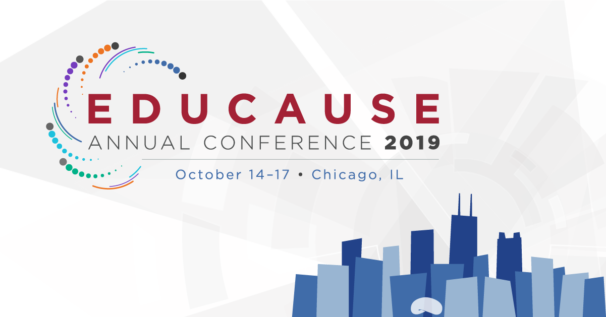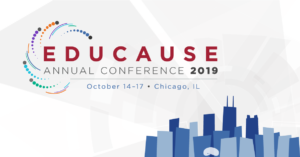EDUCAUSE 2019: What are students really looking for from higher education?

Author: Holly Shiflett, Director, North American Partnerships at FutureLearn
The annual EDUCAUSE conference was held in October in Chicago, Illinois. As many of you know, this event is one of the big IT events in the US and covers a vast array of different themes. For me, a key benefit of EDUCAUSE is having a broad view of a wide variety of education technologies – from systems that support overall campus operations to classroom technology and furnishings to distance education and supporting the adult learner – there is always something new to see and new people to meet. The overall theme of EDUCAUSE this year was diversity and this was evident throughout the proceedings.
I noticed a particular focus on the changing requirements of students and there were a large number of vendors that offered support for the student life cycle and recruiting. From Generation Z (Gen Z) beginning to enter college, increased needs for mental health care, the rise of the adult learner, online degrees and microcredentials, and proactive student support, it is clear that learners are evolving their expectations related to how they want to engage with higher education. This aligns with Pearson’s recent Global Learner Survey which suggested that the future of education may reside in lifelong learning experiences delivered in smaller segments. Coming from an OPM/online education background (I worked previously at Wiley Ed Services), I did notice the lack of presence of most of these providers and publishers in general, as Michael Feldstein pointed out in his recent blog post.
The keynote speaker, Steven Johnson, set us off on a broad vision. “Great ideas,” he said, “come from collaboration and diversity.” He highlighted the danger of what he called the “Blind Spot.” The blind spot happens when we are limited by our own thinking, by our unique life experiences. Johnson suggests that diversity improves our ability to make decisions while highlighting the power of collaboration and diversity. Forbes discussed the same concept in April 2019 and found that smaller more diverse teams offer optimal decision ability. One person can only take an idea so far without the input and different life experiences of others.
Johnson’s example of this concept is Eduarde Scott de Martinville. Martinville actually created the first sound recording 20 years before Edison invented the phonograph in 1877. The device he created mapped sound waves but there was no way to interpret the output. Due to a blind spot (his background as a stenographer), he didn’t consider the need to listen to the recording. As a stenographer, he wrote things down and this life experience led him to transcribe the sound only. Edison came along with different life experiences and figured out a way to play it back which is really what was needed.
My path through EDUCAUSE was punctuated by looking for general themes. I was hoping for a view into how technology might help us to better support students online. This led to my decision on Wednesday to attend the session on Gen Z to hear how digital natives would interpret higher education. I learned about the term Phigital, which means the merging of Digital and Physical worlds. The generation coming up through the education process – Gen Z – has always had technology, they are used to complete customization and view the world as phigital – there is no line between digital and physical.
In higher education, I expect they’ll have high technology expectations and they will be looking to customize their own degrees. Where many grew up with the message of “fit in”, Gen Z has been inducted with the personalization message and they start developing a brand name at an early age. You can see this evidenced in their use of social media.
In addition to the phigital theme, we learned about other characteristics of Gen Z-ers such as:
- Realistic – They are asking about the ROI of higher education and making different decisions
- Driven and Super competitive – They want to be successful and earning money is important
- Expect hyper-customization – They want to build their own college degrees
Based on these criteria, which are, of course, different from any other generation, we can expect students to look for customization and flexibility in higher education. They’ll expect the digital and physical to be part of their experiences. Being practical, they are going to look for the value in higher education and the most cost effective path to achieve their goal – a high paying job. A downside to the constant technology is that Gen Z-ers (and maybe all of us) have tailored our news feeds to our own personal preferences which means we are only hearing one perspective with limited diversity. To succeed in the world, we can go back to Johnson’s point about the blind spot. We all need alternate points of view and the influence of other people’s experiences to be successful.
So, what does this mean for us and how is this related to higher education. The future potentially holds increased learner demands for customized and personalized learning delivered just-in-time and in small, manageable chunks. Universities can work towards more flexible offerings and we saw at EDUCAUSE there is already a focus on the student journey and incorporating diversity of opinions and ideas. At the same time, we can be more deliberate about diversity of thought in higher education and using technology to facilitate engagement and interactivity. In closing, EDUCAUSE, for me, was a great chance to connect and reconnect across a wide range of disciplines, to see some familiar friends and make some new ones. See you in 2020!





